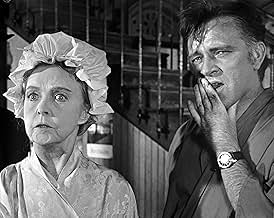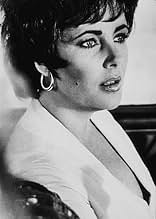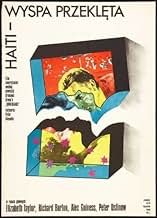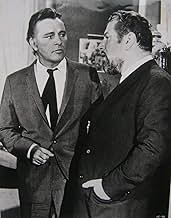IMDb RATING
6.2/10
2.4K
YOUR RATING
A cynical Welsh hotel owner secretly romances a diplomat's wife in Haiti, under the violent reign of the despot "Papa Doc" Duvalier.A cynical Welsh hotel owner secretly romances a diplomat's wife in Haiti, under the violent reign of the despot "Papa Doc" Duvalier.A cynical Welsh hotel owner secretly romances a diplomat's wife in Haiti, under the violent reign of the despot "Papa Doc" Duvalier.
- Awards
- 3 wins & 1 nomination total
Thomas Baptiste
- Haitian Soldier
- (uncredited)
Make Bray
- Haitian Soldier
- (uncredited)
Robin Langford
- Angelito Pineda
- (uncredited)
Dennis Alaba Peters
- César
- (uncredited)
Featured reviews
When I bought "The Comedians" in DVD, I had never heard before of that movie, although I am a fan of the cinema of the specific era. Moreover, it surprised me I didn't know anything about a film with such an excellent cast: it isn't easy to find Burton, Taylor, Guinness, Ustinov, Gish and Ford in the same movie. And there was something else: it was based on a novel and written for the screen by an author whose work I admire: Graham Greene. Therefore, I was curious to find out why a movie with so many virtues flopped and was so soon forgotten. After watching it, I understood: "The Comedians" is a movie that was made for the general audience, a film that should be fun, fast and easy to digest, a typical Hollywood epic. However, it contains none of the classic ingredients: a) it isn't fun, it is a serious political drama, with a deeply British, cynical and black humour, b) it is not melodramatic enough and the love story between Burton and Taylor evolves quite unorthodoxically, without any clichés, c) it isn't fast at all, it's almost three hours without impressive action scenes and much - quite sophisticated - dialogue, d) it isn't easy to digest, it is a sad and bitter movie with an ambiguous ending. These are the reasons why "The Comedians" flopped, but they are also the reasons that make the film exceptionally interesting. Set in Tahiti during the dictatorship of Francois Duvalier ("Papa Doc"), an ideal location for Graham Greene's stories, it demonstrates the cruelty of the regime, through the story of 6 Westerners and some locals in the background. It is a big, flawless production providing food for thought accompanied by excellent cinematography, professional directing and a slow, but strong and memorable scenario. The claustrophobic atmosphere of the brutal dictatorship is exceptional, the actors give magnificent performances and it is also one of the few films that end without an answer, without a typical happy or tragic ending. I recommend it to viewers that enjoy films that provide more than a pleasant evening.
Burton, Taylor, Guinness, and Ustinov are a heady combination but I will not remember the film for any one of their "acting" capabilities as much as the four wonderful main characters woven by Graham Greene and Peter Glenville. There is almost an unrecognizable James Earl Jones whose fabulous voice is overshadowed in this film by those of Burton and the suave Guinness.
"I have no faith in faith," rants Brown (Burton) the anti-hero of the film--a typical Greene character (compare with Greene's 'The Burnt-out case'). Cynicism is turned into comedy. The splashes of Catholic motifs made in passing reference ("defrocked priest") hark back to Burton's earlier role in "Night of Iguana." Guinness' reference to looking like a "Lawrence of Arabia" recalls his own role as Prince Faisal in Lean's movie. Not having read Greene's book, I am not sure whether Greene introduced these clever details into the script to suit the actors or whether the details had previously existed in the book.
The gradual unmasking of the Major (Guinness) is a treat creatively captured by Glenville and Greene. The final speech made by Burton to his group of ragged rebels seem to have a common "comic" thread with George Clooney's speech to his soldiers towards the end of the recent Mallick's "The Thin Red Line".
Ustinov's diplomat and Taylor's vulnerable diplomat's wife, who admits to her lover that he is the fourth "adventure," are both comedians--Greene's likable misfits who cannot change their destiny and are strangely reconciled to accept their inevitable end. All the four main characters are "prepared" for their destiny they have designed for themselves as a consequence of previous actions in life. The closing shot of the film is a shot of a suggestive blue sky, redeeming the foibles of the comedians on terra firma.
I admit that when I saw the film some 20 years ago, I did not appreciate the film as I do now. I was missing the forest for the trees. This film does not belong to Burton, Taylor, Guinness, Ustinov, Jones or Lillian Gish. It belongs to Greene, Glenville and the French cinematographer Henri Decae.
I do not imply that Burton was not good--but George C Scott said one should evaluate a performance by remembering the character more than the actor. It is in that context that I remember the four main characters. Burton's kisses are different here than say in "Boom" or "Cleopatra"--only to add detail to the character. Taylor is strangely subdued only to add power to her smoldering role. Guinness gradual unmasking is pathetic yet endearing only to add more substance to the character. Decae's camera captures details that shocks--e.g., empty drawers in desks to collect bribes, public executions of rebels watched by school kids...
I am surprised that this film, to my limited knowledge, has never been taken seriously for what it offers--a superb script, commendable acting, good direction, and some fine camera-work.
"I have no faith in faith," rants Brown (Burton) the anti-hero of the film--a typical Greene character (compare with Greene's 'The Burnt-out case'). Cynicism is turned into comedy. The splashes of Catholic motifs made in passing reference ("defrocked priest") hark back to Burton's earlier role in "Night of Iguana." Guinness' reference to looking like a "Lawrence of Arabia" recalls his own role as Prince Faisal in Lean's movie. Not having read Greene's book, I am not sure whether Greene introduced these clever details into the script to suit the actors or whether the details had previously existed in the book.
The gradual unmasking of the Major (Guinness) is a treat creatively captured by Glenville and Greene. The final speech made by Burton to his group of ragged rebels seem to have a common "comic" thread with George Clooney's speech to his soldiers towards the end of the recent Mallick's "The Thin Red Line".
Ustinov's diplomat and Taylor's vulnerable diplomat's wife, who admits to her lover that he is the fourth "adventure," are both comedians--Greene's likable misfits who cannot change their destiny and are strangely reconciled to accept their inevitable end. All the four main characters are "prepared" for their destiny they have designed for themselves as a consequence of previous actions in life. The closing shot of the film is a shot of a suggestive blue sky, redeeming the foibles of the comedians on terra firma.
I admit that when I saw the film some 20 years ago, I did not appreciate the film as I do now. I was missing the forest for the trees. This film does not belong to Burton, Taylor, Guinness, Ustinov, Jones or Lillian Gish. It belongs to Greene, Glenville and the French cinematographer Henri Decae.
I do not imply that Burton was not good--but George C Scott said one should evaluate a performance by remembering the character more than the actor. It is in that context that I remember the four main characters. Burton's kisses are different here than say in "Boom" or "Cleopatra"--only to add detail to the character. Taylor is strangely subdued only to add power to her smoldering role. Guinness gradual unmasking is pathetic yet endearing only to add more substance to the character. Decae's camera captures details that shocks--e.g., empty drawers in desks to collect bribes, public executions of rebels watched by school kids...
I am surprised that this film, to my limited knowledge, has never been taken seriously for what it offers--a superb script, commendable acting, good direction, and some fine camera-work.
Based on the novel by Graham Greene, The Comedians is a look at Haiti that nearly 40 years later remains the same - political unrest, poverty, corruption, and brutality.
Set during the time of Papa Doc, the story centers on Richard Burton as the white owner of a hotel left to him by his mother. He is in love with the wife (Elizabeth Taylor) of an ambassador (Peter Ustinov) and has managed to remain apolitical. However, events force him to enter the fray.
The Comedians holds one's interest, although it's on the long side. The cast is remarkable: Burton, Alec Guinness, Peter Ustinov, Taylor, James Earl Jones, Lillian Gish, Georg Stanford Brown, Roscoe Lee Brown, and, in a small role, Cicely Tyson.
Taylor is very beautiful, although her accent is all over the place. She sounds French in the beginning, then English, then like Elizabeth Taylor, and then in the middle of the movie, we find out she's German.
Though Burton went the schlock for cash route in his career, he was a wonderful, handsome actor with a remarkable voice. Towards the end of the film, he has a scene with Guinness that is well worth the wait - two great actors in a subdued and remarkable scene.
The Haitian scenery belies what lies underneath. It's a film that is perhaps more timely today than it was in 1967.
Set during the time of Papa Doc, the story centers on Richard Burton as the white owner of a hotel left to him by his mother. He is in love with the wife (Elizabeth Taylor) of an ambassador (Peter Ustinov) and has managed to remain apolitical. However, events force him to enter the fray.
The Comedians holds one's interest, although it's on the long side. The cast is remarkable: Burton, Alec Guinness, Peter Ustinov, Taylor, James Earl Jones, Lillian Gish, Georg Stanford Brown, Roscoe Lee Brown, and, in a small role, Cicely Tyson.
Taylor is very beautiful, although her accent is all over the place. She sounds French in the beginning, then English, then like Elizabeth Taylor, and then in the middle of the movie, we find out she's German.
Though Burton went the schlock for cash route in his career, he was a wonderful, handsome actor with a remarkable voice. Towards the end of the film, he has a scene with Guinness that is well worth the wait - two great actors in a subdued and remarkable scene.
The Haitian scenery belies what lies underneath. It's a film that is perhaps more timely today than it was in 1967.
After delighting audiences in director Franco Zeffirelli's 1967 hit adaptation of Shakespeare's THE TAMING OF THE SHREW, the Burtons' popularity with audiences seemed to be on the wane as their next film, Peter Glenville's THE COMEDIANS (1967) became their first full-fledged box office disappointment. There was much publicity surrounding the political thriller as it shot in Africa (masquerading as Haiti) and the fact that Taylor accepted half her usual salary and took second billing behind Burton kept gossips wagging for months (she reportedly only took the part out of fear of being replaced with Sophia Loren). But when the film opened, critics found it slow and talky and audiences simply seemed uninterested. Although the film is never quite as interesting or as suspenseful as it could have been, I dare say that THE COMEDIANS probably plays a great deal better today without the heavy expectations of the time surrounding it.
Graham Greene does a respectable job of paring down his complex novel for the screen, and director Glenville keeps the film moving at a reasonable pace in spite of its lengthy runtime of 150 minutes. The film is always interesting and occasionally gripping, although Greene and Glenville keep the audience at a relative distance which prevents the picture from striking as hard as it could have. Burton is in good form, and Alec Guinness, Paul Ford, and Lillian Gish all turn in top notch support (only Peter Ustinov feels under utilized). Unfortunately, Taylor is dreadfully miscast as a German military wife complete with a woefully unconvincing accent and her ill-fitting presence creates several lulls in the film as the number of scenes between her character and Burton's character are increased (in order to give the diva her proper screen time) which hampers a few long stretches of the film and slightly undermines what could have been a first-rate effort.
Graham Greene does a respectable job of paring down his complex novel for the screen, and director Glenville keeps the film moving at a reasonable pace in spite of its lengthy runtime of 150 minutes. The film is always interesting and occasionally gripping, although Greene and Glenville keep the audience at a relative distance which prevents the picture from striking as hard as it could have. Burton is in good form, and Alec Guinness, Paul Ford, and Lillian Gish all turn in top notch support (only Peter Ustinov feels under utilized). Unfortunately, Taylor is dreadfully miscast as a German military wife complete with a woefully unconvincing accent and her ill-fitting presence creates several lulls in the film as the number of scenes between her character and Burton's character are increased (in order to give the diva her proper screen time) which hampers a few long stretches of the film and slightly undermines what could have been a first-rate effort.
This had all the making of a first rate political drama. There is an acclaimed novelist whose novel this was adapted from, an exciting premise (British expatriates in Haiti, brutally ruled by the brutal and eccentric "Papa Doc" Duvliar's, get caught up in political oppression and rebellion), an star-studded ensemble cast, and exotic locations. So why does it fall so flat? Part of the problem is that it the film is overlong, lasting for around two and a half hours. The result is a story which moves very slowly with a lot of excess chat. Also, there is too much emphasis on the dreary soap opera love triangle of the three main characters (Richard Burton, Elizabeth Taylor, and Peter Ustinov). The Burton character, a cynical hotel owner of British decent, is obviously copied on the Humphrey Bogard character in "Cassablanca." The film also fails to take advantage of the official oppression and corruption which is the cause of the country's problems. There is little sense of danger until the last half hour, and even then the action is sporadic. There is also a failure to take advantage of the locations. The film was shot in Benin, an African country which isn't a convincing substitute for Haiti, though there was obviously no way this could have been shot in Haiti itself. But the photography is pretty ordinary. There are a few good scenes, including a voodoo ceremony and a shootout in a cemetery. Also, some supporting characters are actually rather interesting, helped by fine performances by James Earl Jones as a surgeon who supports the rebels and Raymond St. Jacques as a sinister police commander who tortures and murders people as casually as most people would order a take-out lunch. Unfortunately, but most of the film is a case of missed opportunities. It's passable, but overlong and never worthy of the talent that went into it.
Did you know
- TriviaSeveral critics noted that the ending of this movie is at least a little more positive and optimistic than the bleak ending of Graham Greene's original novel, and attacked the movie for "softening" the subject. Greene, however, insisted that the more upbeat ending had been his own idea.
- GoofsIn the last few shots in the movie, as Petit Pierre (Roscoe Lee Browne) is leaving the airport, there is initially a departing Vickers VC10 airliner flying overhead from right to left, this changes to a close up, followed by a shot of the same airliner now flying into the distance - unfortunately this is different 4 engine Jetliner.
- Quotes
Brown: I don't believe in causes.
Dr. Magiot: The role of cynic doesn't really suit you, Brown.
Brown: I don't believe in play-acting either.
Dr. Magiot: You imagine because you've lost one faith, you've lost all? You're wrong, Brown. There is always an alternative to the faith we lose.
Brown: I have no faith in faith.
- ConnectionsFeatured in The Comedians in Africa (1967)
- How long is The Comedians?Powered by Alexa
Details
- Release date
- Countries of origin
- Languages
- Also known as
- Les comédiens ou l'enfer d'Haïti
- Filming locations
- Production companies
- See more company credits at IMDbPro
Box office
- Gross US & Canada
- $5,200,000
- Runtime
- 2h 30m(150 min)
- Sound mix
- Aspect ratio
- 2.35 : 1
Contribute to this page
Suggest an edit or add missing content



































